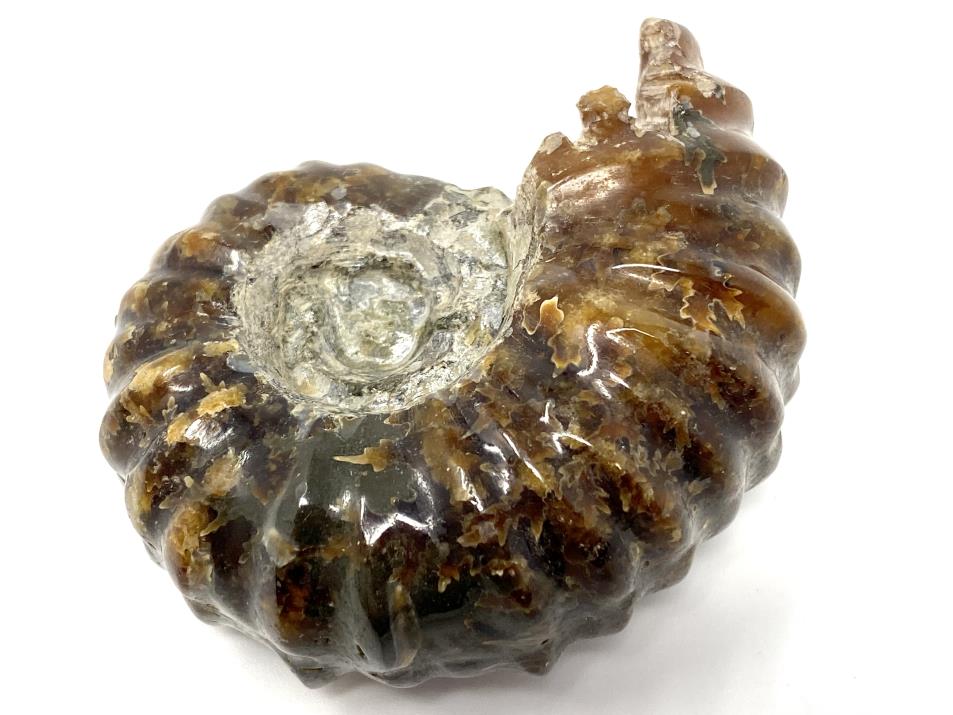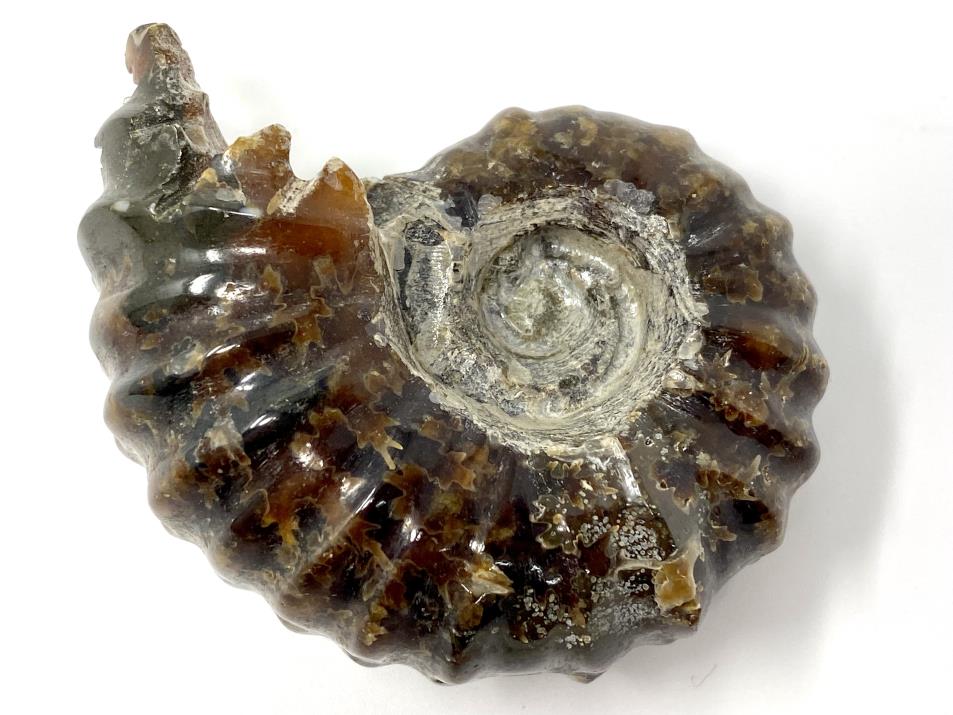-
20%

-
20%

Madagascan Direct
Ammonite Douvilleiceras Polished 6.3cm
Ammonite Douvilleiceras Polished 6.3cm
Reference Number: 15737
Dimensions: 6.3cm at widest point
Couldn't load pickup availability
Polished Ammonite Fossils For Sale (Douvilleiceras Ammonites)
This stunning High-Grade Polished Ammonite Fossil from Madagascar, of the Douvilleiceras Ammonite Species, measures 6.3cm wide and has been carefully polished on top of its fossilised shell, which displays gorgeous chocolate brown, caramel-coloured, and cream suture patterns.
Dating from the Cretaceous Period at a majestic 120 million years old, this gorgeous Douvilleiceras Ammonite Fossil is an exciting piece of history.
This genuine, real Ammonite Fossil, found in the jungles of Madagascar, has been carefully hand-polished to reveal the beauty of its rich golden Calcite mineral replacements, as well as its impressive fern-like suture patterns.
This Douvilleiceras Ammonite displays a glistening ribbed shell which is wonderfully tactile to hold, and a stunning exposed mouth which has been prepared by hand along its suture lines.
The original Ammonite Shell was replaced over a very long period of fossilisation, wherein water dissolved the original hard parts of the ammonite shell and replaced it with mineral matter: most commonly, Calcite minerals.
What Are Ammonites?
Ammonites are a group of extinct molluscs which somewhat resembled a shelled squid when they were alive.
These ancient sea creatures had tentacles like the modern octopus, and spiral shells like Nautilus creatures.
The fossilised remains of these sea creatures are perhaps the most popular fossils in the world today.
What Are Douvilleiceras Ammonites?
This particular ammonite is a member of the Douvilleiceras species of ammonites.
Douvilleiceras is a species of Ammonite (an extinct marine mollusc) that can often be distinguished from other ammonites by its highly textured ribbed shell.
How Old Are Ammonites?
Ammonites first appeared on the fossil record around 240 million years ago, in the Triassic Period, and died out 65 million years ago with the dinosaurs during the Cretaceous-Tertiary Mass Extinction Event.
This Douvilleiceras Ammonite Fossil dates back to the Cretaceous Period, meaning it is 120 million years old.
Although this particular species of ammonite fossil is an example of a fossil from the Cretaceous Period, there are many ammonite species such as Perisphinctes Ammonites which are even older: Perisphinctes Ammonites are fossils from the Triassic period and are approximately 248 million years old!
Where Do Ammonites Come From?
Ammonite Fossils can be found in many countries worldwide: Ammonites swum all around the seas of the world millions of years ago, and their fossils wash up on many shores worldwide.
Our Ammonites, including this piece, are Ammonite fossils from Madagascar: they were discovered in the jungles of Mahajanga on the North West Coast of the island.
Madagascar fossils and crystals are renowned world-wide for their quality and variety, with Madagascar Ammonites being some of the most revered, high-quality Ammonite Fossils in the world.
How Were Ammonites Fossilised?
When an Ammonite died, it was preserved through a slow fossilisation process that took place over millions of years, beginning with the Ammonite's body sinking into seabed sediment, and culminating in the Fossilised Ammonite being preserved within layers of minerals and rock.
- The Ammonite died, and its body sunk into the seabed sediment
- The Ammonite body began to decay and decompose: during the decomposition process, bacteria broke the ammonite body down and water started to dissolve the original ammonite shell (this shell was later replaced with minerals like Calcite)
- This process of decomposition affected redox conditions in the marine environment, leading to dissolved minerals such as carbonates and phosphates becoming less soluble in the surrounding sea water
- These hardened, previously dissolved minerals were precipitated out of the water, and enveloped the ammonite in a solid concretion like a rock, which ensured the ammonite shell was fossilised and preserved
- Some minerals which seeped into the ammonite remains, such as colourful Calcite minerals, replaced the decomposed organic matter of the ammonite body over time, leading to the ornately patterned interiors and colourful chambers of Ammonite Fossils (via mineral replacements)
- The rock concretion covering the ammonite fossil was then either naturally eroded, or excavated by humans, to expose the fossil within
Sacred Geometry Of Ammonite Spirals
In sacred geometry, the spiral shape has powerful spiritual significance, and signifies growth and expansion.
As ammonite shells display distinctive spiral shapes, ammonites embody this spiritual meaning of growth too.
An ammonite shell is a perfect example of the sacred Golden Mean Spiral, a symbol of the infinite Fibonacci Sequence and the revered Golden Ratio.
As a result, ammonites are believed to be strongly symbolic of order and perfection in not just the natural world, but the entire universe.
Ammonite Fossil Collections
This stunning Polished Douvilleiceras Ammonite Fossil was specially selected for its quality, and would make a perfect addition to any fossil collection or ammonite collection.
This striking Polished Ammonite Fossil would make a great fossil gift.
Buy Douvilleiceras Ammonite Fossils Online at Madagascan Direct.
Product Reference Number: 15737
Share
Shop All Polished Ammonites For Sale Online
-
Polished Cleoniceras Ammonite Pendant 4.8cm
Regular price £17.60 GBPRegular priceUnit price / per£22.00 GBPSale price £17.60 GBPSale -
Polished Cleoniceras Ammonite Pendant 5cm
Regular price £23.20 GBPRegular priceUnit price / per£29.00 GBPSale price £23.20 GBPSale -
Polished Cleoniceras Ammonite Fossil 12.4cm
Regular price £69.60 GBPRegular priceUnit price / per£87.00 GBPSale price £69.60 GBPSale -
Ammonite Cleoniceras Polished 10.9cm
Regular price £55.20 GBPRegular priceUnit price / per£69.00 GBPSale price £55.20 GBPSale -
Ammonite Cleoniceras Polished 11.4cm
Regular price £51.20 GBPRegular priceUnit price / per£64.00 GBPSale price £51.20 GBPSale -
Large Ammonite Cleoniceras Polished 15cm
Regular price £122.40 GBPRegular priceUnit price / per£153.00 GBPSale price £122.40 GBPSale
















